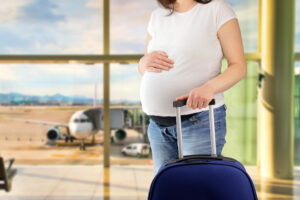Basics About Pregnancy And Travel
December 31, 2018
 Traveling, especially during the holiday season, is common among many people. However, for pregnant women, traveling might present a specific set of challenges.
Traveling, especially during the holiday season, is common among many people. However, for pregnant women, traveling might present a specific set of challenges.
Is Traveling While Pregnant Safe?
Many members of the medical community believe that travel poses few if any, risks for women
experiencing uncomplicated pregnancies. However, professionals do recommend that extensive
travel is avoided after about thirty-six weeks of pregnancy. The middle stages of pregnancy are
the most optimal time for a woman to travel.
Circumstances Under Which Expecting Women Should Not Travel
Expecting women who are followed for existing medical conditions during pregnancy or are
carrying twins or multiples may have restrictions placed on their ability to travel. Discussing this
with your obstetrician is always important before considering travel.
Precautionary Methods To Employ
Any expecting women planning a trip can employ several precautionary measures to further
safeguard the health of both mother and fetus. Such measures include:
-Thorough Medical Evaluation
Prior to embarking on any major excursion, an expecting woman should consider receiving a
comprehensive physical examination from her healthcare provider. Such an evaluation can help
determine if mother or baby possess any underlying medical issues that might complicate travel.
–Avoiding Travel To Specific Global Regions
Pregnant individuals might choose to avoid visiting areas of the world prone to diseases or with
poor sanitation or water quality. If travel to such areas is unavoidable, medical professionals
recommend obtaining vaccinations where appropriate. Always consult with your obstetrician
before traveling outside of the country as they may be aware of relevant information
regarding the planned destination.
-Standing And Engaging In Light Exercise At Varying Intervals
Pregnancy increases the risk for development of a potentially serious cardiovascular disorder
called deep vein thrombosis (DVT). This may occur during extended periods of inactivity and
can interrupt the flow of normal circulation, precipitating the development of blood clots.
During long trips, expecting women are encouraged to engage in precautionary actions:
1. Stand frequently or partake in light exercises such as walking or stretching whenever possible
2. Wear non-constricting clothing that is not too tight and does not tug at the skin
3. Consume extra quantities of fluids, particularly water
Plan A Less Strenuous Itinerary
Fill your days with light activities. Be careful with activities like hiking.
For more information on this or additional topics, please visit gwmfm.com.




